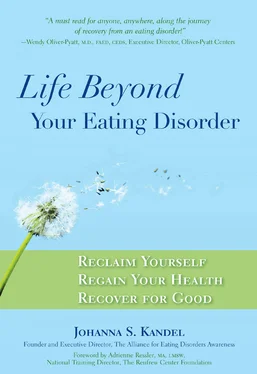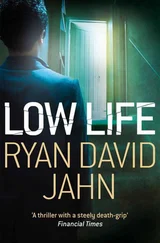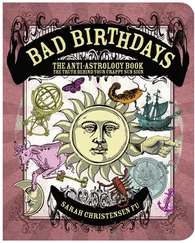When my mother saw me, she started to cry. She began shaking me and screaming, “What are you doing? You’re killing yourself!”
In any case, that evening in the bathroom, my mother couldn’t help seeing what I’d been hiding, and all I could do was to keep reassuring her that everything was okay, I was in control and I knew what I was doing. Still, she insisted that I see a doctor, and she went with me. To my amazement, when I got on the scale he looked at my weight and said, “You’re really thin, but you’re okay.” Then he looked at my mother and said, “Just give her some of your good French cooking.” This was 1996. Anorexia and bulimia were no longer secrets. They were listed in the Diagnostic and Statistical Manual of Mental Disorders; people knew about the death of Karen Carpenter; Tracey Gold had gone public about her battle with an eating disorder; and the seminal movie about anorexia, The Best Little Girl in the World, had aired on network television more than ten years before. But then, as now, there were many health-care providers who hadn’t been properly educated about how to diagnose or treat eating disorders. And, of course, when a parent hears from a doctor whom she trusts that her child is okay, her inclination is to be relieved and accept the diagnosis.
So I’d dodged that bullet, at least for the moment. But about a month later my mother noticed that I wasn’t getting any better. I still looked exhausted, with dark circles under my eyes, and I was still losing weight. At that point my mother realized that the problem was more serious than my simply being a little thin. She took me to another doctor, who was educated enough about eating disorders to diagnose my anorexia. When I saw the word anorexia on my chart for the first time, I freaked out. I was terrified that my disorder would be taken away from me. And, most of all, that they would make me gain weight! Although on one level I didn’t want to live with my eating disorder, on another level I was petrified of living without it. It was the only aspect of my life that I believed to be in my control, and there was no way I was willing to give that up.
If my guidance counselor asked what I’d eaten that day, I’d come up with a whole list I could rattle off so convincingly that I sometimes got angry with myself for eating things I actually hadn’t eaten.
I was put through a battery of tests that showed I had very low blood pressure, a very low heart rate, reduced kidney function and full-blown osteoporosis. You’d think hearing all that would have scared me into recovery, but no, it didn’t. Then the doctor asked when I’d had my last period, and I just cracked up. He asked me why I was laughing, and I responded, “Oh, N/A!” “N/A? What does that mean?” “It means ‘not applicable.’ I’ve never gotten a period.” “And you’re seventeen and a half?” “Yes, but it’s okay. I’m a ballet dancer. We don’t get those.” “But you’ve never gotten your period? That’s not good. That’s contributing to your bone loss and a lot of other things, too.” My body was being starved, and we all need to eat. We need fuel, and my body was getting that fuel wherever it could—internally, from my bones, from my body fat and from my muscles.
The doctor looked at my mother and said, “Just give her some of your good French cooking.”
The doctor then told me that I’d probably have fertility issues in the future, and my response to that was “Good. I don’t want to get fat, anyway.” Sad as that may sound, I simply had no sense of the danger to my health. I couldn’t see past the present moment. In that moment all I wanted to do was dance, and I knew that I needed to be thin to dance. Honestly, it was the only reason I was living at that time.
On one level I didn’t want to live with my eating disorder; on another level I was petrified of living without it.
Even though the doctor knew enough to diagnose me, he still didn’t know how to treat me. His approach was to give me hormones and steroids to bring on my period and stimulate my appetite. Basically, he was going to fix me with medication. I was still restricting my food intake, but because of all the medications I was taking, I gained weight. In a matter of three months I doubled my body weight! Please note, I’m purposely not giving you numbers here, because I would never want my number to become a goal weight for anyone else. If you’re struggling with an eating disorder, I can guess that you focus on numbers—the number of calories, fat, carbohydrates and proteins in foods you eat; the number you see on the scale; and the number you believe would be perfect. I also need to say right now—because I know that if you’re reading this, you’re probably thinking, That’s it, no treatment for me! No one is going to make me gain that much weight!—that it is extremely unlikely something like that would happen today.
The diet gave me back my sense of control. My anorexia and the exercise bulimia came back with a vengeance.
For me, however, the doctor was giving me all those medications at a time when I felt completely helpless. Up to that point I had always felt as if I were in control, but now, no matter what I did, the drugs were causing me to gain weight. I was incredibly anxious and depressed, and I felt as if everything I’d worked so hard to attain, including my ability to dance, was slipping through my fingers like grains of sand. I was starving, and I figured that since I couldn’t control my weight anyway, I might as well just eat and use the food to numb all those negative feelings. That was when the bulimia started. I never used self-induced vomiting, but I would binge and then purge with laxatives and compulsively overexercise.
At that point, I was about to graduate high school, and this was the time when I should have been auditioning to join a ballet company, but by that point I was too big to be a ballet dancer. Instead, I determined to use the next year to get myself back in shape and back on track. I stayed home and continued to dance at the academy where I’d been studying. By then I was in the most advanced group, so my classmates and I were often invited to take company class and sometimes also given roles in their productions.
Now I didn’t know who I was. My only remaining sense of identity came from my eating disorder. I had, in essence, become my eating disorder.
At the same time, without telling my primary care physician, I also went to see a doctor who was a metabolic specialist and who already knew my history. I remember her asking me what I wanted more than anything in life. I said it was to dance, and she told me that she’d help me make my dream come true. Her way of doing that was to put me on a totally insane plan that involved my taking about thirty supplements a day (to date I still don’t know what was in them) and going on a refined Atkins-type diet. Although I knew it wasn’t healthy and was the last thing that I should have been doing, it gave me back my sense of control, and, in fact, I did start to lose weight.
As I began to regain a (misguided) sense of confidence, I auditioned and was offered an apprenticeship with a ballet company in Orlando. By then I’d achieved what the metabolic doctor considered to be my goal weight, so she took me off most of the supplements I’d been taking. I was supposed to be maintaining my weight, but once I was on my own again, I began to restrict even the meal plan she’d given me and I stopped taking the medications that had been prescribed by my primary care physician. My anorexia and the exercise bulimia, which had never really gone away, came back with a vengeance, and I fell back into my disordered eating really hard and really quickly. About six weeks later my mother came up to Orlando to see me perform, and, of course, she noticed how much weight I had lost.
Читать дальше












